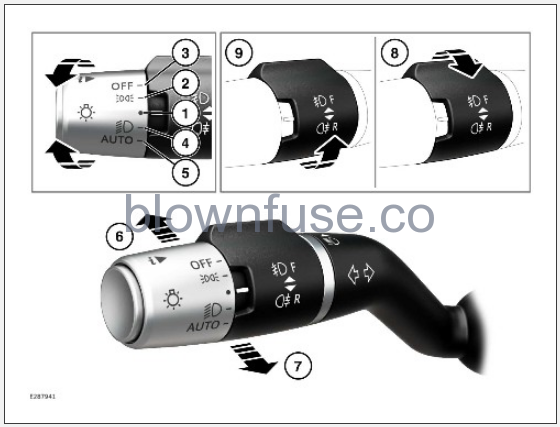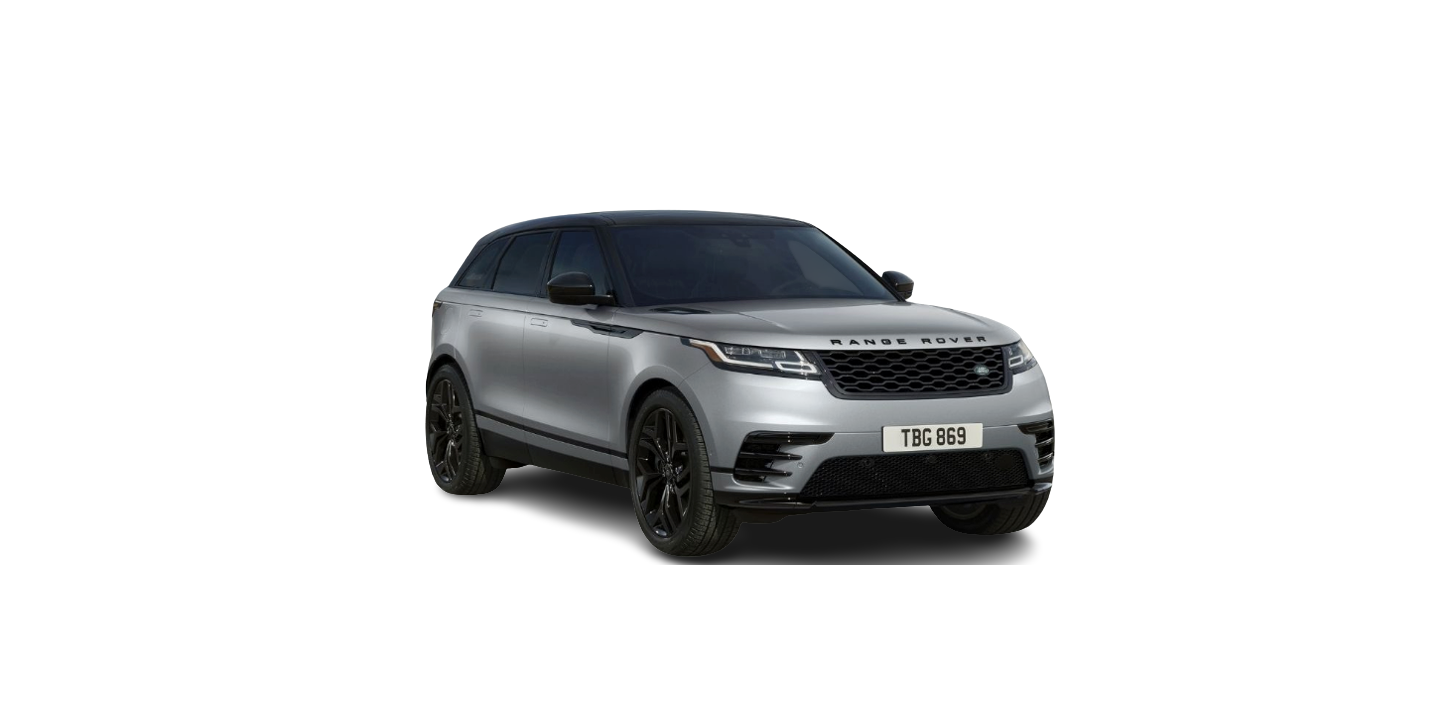2023 Land Rover RANGE ROVER VELAR EXTERIOR LIGHTS
EXTERIOR LIGHTS OVERVIEW
The exterior lights operate automatically depending on the ambient lighting conditions. A number of different features are available. The system automatically selects an appropriate feature, based on vehicle and ambient conditions. It may be necessary to manually override these features in some circumstances.
Some manual operations may not be possible due to vehicle activity or legislative requirements.
LIGHTING CONTROL
The lighting control is located to the left of the steering wheel. Move the lighting control in the appropriate direction to select the desired function. Once released, the lighting control returns to the neutral position.

- Neutral position.
- Side lights.
- OFF.
- Low beam headlights.
- AUTO mode.
- High beam headlights.
- High beam headlights flash.
- Rear fog lights.
- Front fog lights.
The lighting control returns to the neutral position after a manual lighting selection is made.
Rotate the lighting control to position (2) to switch the side lights on. The instrument panel warning lamp illuminates to confirm the selection. See SIDE LIGHTS (GREEN).
Rotate the lighting control to position (3) to manually switch off all exterior lights. The instrument panel extinguishes all related warning lamps.
Rotate the lighting control to position (4) to switch the low beam headlights on. The instrument panel warning lamp illuminates to confirm the selection. See LOW BEAM (GREEN).
Rotate the lighting control to position (5) to select AUTO mode. When AUTO mode is selected, the following lighting features are enabled:
- Daytime Running Lamps (DRL). See DAYTIME RUNNING LIGHTS (DRL).
- Headlight courtesy delay. See HEADLIGHT COURTESY DELAY.
- Windshield wiper detection. See WINDSHIELD WIPER DETECTION.
AUTO mode is only active when the vehicle’s ignition is switched on and drive gear is selected.
The instrument panel warning lamp illuminates to confirm the selection. See AUTO LIGHTS (WHITE).
Low ambient light levels may also cause the AUTO mode to activate.
With the low beam headlights switched on, push the control forward (6) and release. The high beam headlights illuminate. The instrument panel warning lamp also illuminates to confirm the selection. See HIGH BEAM (BLUE). Push the control forward a second time, and release, to switch the high beam headlights off. The instrument panel warning lamp extinguishes.
Do not use the high beam headlights where they may distract other road users. Misuse of the high beam headlights could lead to an accident, potentially causing serious injury or death.
Pull the lighting control back (7), and release, it to flash the high beam headlights. The instrument panel warning lamp illuminates while the lighting control is held in the flash position.
Rotate the collar (8) towards the steering wheel, and release, it to switch the rear fog lights on. The instrument panel warning lamp illuminates to confirm the selection. See REAR FOG LIGHTS (YELLOW). Rotate the collar towards the steering wheel, and release, it a second time to switch the rear fog lights off. The instrument panel warning lamp extinguishes.
The rear fog lights only operate if the side lights or low beam headlights are switched on.
Rotate the collar (9) away from the steering wheel, and release, it to switch the front fog lights on. The instrument panel warning lamp illuminates to confirm the selection. See FRONT FOG LIGHTS (GREEN). Rotate the collar away from the steering wheel, and release, it a second time to switch the front fog lights off. The instrument panel warning lamp extinguishes.
The front fog lights only operate if the side lights or low beam headlights are switched on.
AUTO mode is switched off if the front fog lights are switched on.
EXTERIOR LIGHTS CONDENSATION
Condensation in the exterior lights is a natural phenomenon. Condensation can occur under certain atmospheric conditions, or after washing the vehicle. The performance and life expectancy of the lights is not affected. Condensation should partially or fully clear with regular use of the lights, and within 48 hours of dry atmospheric conditions.
LED lights emit less heat than halogen or xenon lights, and may take longer to clear. The performance of the lights is not affected.
DAYTIME RUNNING LIGHTS (DRL)
The Daytime Running Lamps (DRLs) illuminate during normal daylight conditions in order to make the vehicle more visible to other road users.
The DRLs illuminate automatically when the following conditions are met:
- AUTO mode is active. See LIGHTING CONTROL.
- High ambient light levels are detected.
- The engine is running.
- A drive gear is selected.
The rear position lights automatically illuminate when the DRLs illuminate.
HEADLIGHT COURTESY DELAY
The headlight courtesy delay feature illuminates the headlights for a period of time after the vehicle has been switched off.
Headlight courtesy delay operates when the following conditions are met:
- AUTO mode is active. See LIGHTING CONTROL.
- Low ambient light levels are detected.
- The vehicle’s ignition is switched off.
The delay period can be adjusted via the touchscreen. To adjust the delay period:
- Touch the settings icon.¹
- Select ALL.
- Select Vehicle.
- Select Exterior lights.
- Select Headlight delay.
- Select a time delay option.
- Touch the exit icon.²
Settings icon.¹
Exit icon.²
Press the headlight button on the smart key to switch the courtesy delay headlights off. See SMART KEY OPERATION.
WINDSHIELD WIPER DETECTION
The side lights, headlights, and tail lights automatically switch on if the following conditions exist:
- AUTO mode is active. See LIGHTING CONTROL.
- The windshield wipers are operational for 20 seconds or more.
The lights extinguish 2 minutes after the windshield wipers stop operating.
AUTO HIGH BEAM ASSIST (AHBA)
Auto High Beam Assist (AHBA) automatically selects and deselects the high beam headlights based on various light readings, including:
- Ambient lighting.
- Road lighting.
- Lighting from oncoming vehicles.
AHBA must not be relied on to react correctly in all circumstances. The driver remains responsible for the correct use of the headlights at all times. Incorrect use of the headlights could lead to an accident, potentially causing serious injury or death.
AHBA uses sensors mounted on the rear of the rear-view mirror. Keep this area of the vehicle clean and free from obstructions, e.g. stickers, debris, mud, snow, or ice. Failure to do so may lead to sensor miscalculations, which could lead to an accident, potentially causing serious injury or death.
- Touch the settings icon.¹
- Select ALL.
- Select Vehicle.
- Select Exterior lights.
- Touch the Automatic high beam assist toggle to switch AHBA on or off.
- Touch the exit icon.²
Settings icon.¹
Exit icon.²
The instrument panel displays a warning lamp to confirm that AHBA has been selected. See AUTO HIGH BEAM (BLUE).AHBA can be manually overridden using the lighting control. Push the lighting control forward, and release, it to manually change from low beam to high beam headlights. The instrument panel extinguishes the AHBA warning lamp and illuminates the high beam headlights warning lamp. See HIGH BEAM (BLUE). Pull the lighting control back, and release, it to manually change from high beam to low beam headlights. The instrument panel extinguishes the AHBA warning lamp and illuminates the low beam headlights warning lamp. See LOW BEAM (GREEN).To reactivate AHBA, push the lighting control forward, and release. The instrument panel extinguishes the high beam or low beam warning lamp and illuminates the AHBA warning lamp.
AUTO HIGH BEAM ASSIST (AHBA) LIMITATIONS
Auto High Beam Assist (AHBA) is only active when the vehicle is traveling at speeds in excess of 25 mph (40 km/h). AHBA deactivates when the vehicle’s speed drops below 15 mph (24 km/h).
The following may affect the operation of AHBA:
- Highly reflective road signs.
- Poorly lit road users, e.g., cyclists or pedestrians.
- Adverse weather conditions, e.g. rain or fog.
- A dirty or obscured sensor.
- A dirty, damaged, or misted windshield.
- An icy or frosted windshield.
- Oncoming vehicles are partially obscured by a central barrier.


